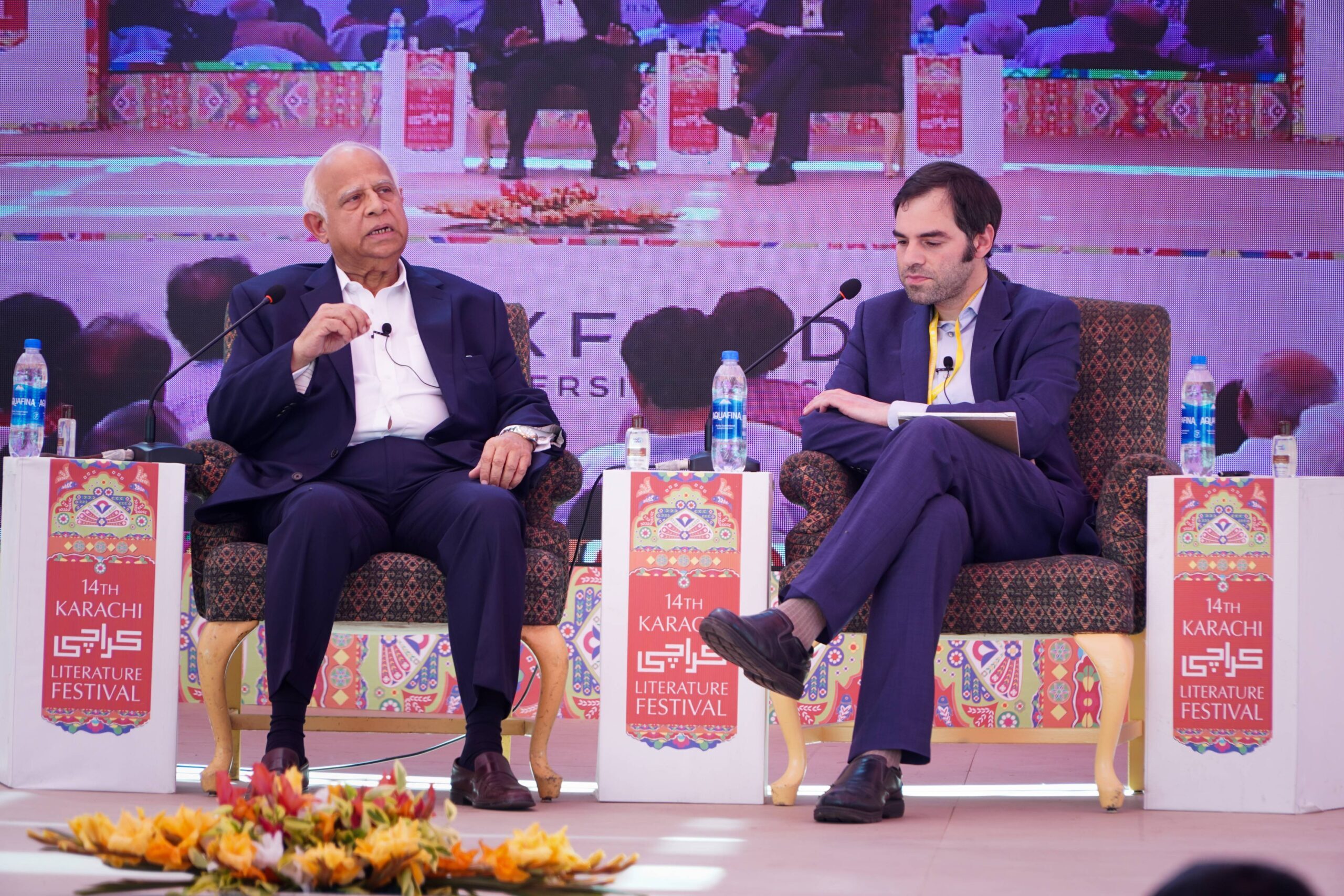Ikram Sehgal, Co-Chairman Pathfinder Group spoke at Karachi Literature Festival 2023 on the topic, “Untangling South Asia.” This segment of the event was organized in collaboration with Oxford University Press (OUP). Mr. Sehgal welcomed Mr. Michael Kugelman – Director, South Asia Institute at the Woodrow Wilson Center and Deputy Director of the South Asia Program – and appreciated his commitment towards South Asia, his factual and realistic writings on the region, knowing its objective, and understanding the people. Ikram Sehgal recalled that, I have been discussing South Asia and its prospects with Michael Kugelman and he has been spectacle host and listened to my point view with serious attention and without any prejudice. His specialty is neutral analysis in his articles/speeches forthrightly in a candid way.
Mr. Sehgal further said that, “interacting with Mr. Michael provide us with two opportunities; first, our point of view is being read objectively and second, to gain insight into the United States’ standpoint as he reflects it in his writings and speeches.” Mr. Sehgal said that, one of the reasons why I think South Asia is difficult to understand is that so many other civilizations have influenced it. It’s not that South Asia has been free or bounded by this thing.
You have people from Central Asia and East Asia coming in, and then you have a blend of many from the Middle East. So, in almost every city, except in South India, you have a blend of civilizations. This blend of civilization is further accentuated by the fact that even in regions, you have that’s it. What has happened is that the urban cities are coming, and in the urban cities, what you call ghettos in the United States, actually, you’ve had entire areas where you said, “Okay, ‘Lyari’ is mostly Sindhi or Baloch or ‘Malir’ is like that, and the center of Karachi is mostly ‘Mohajir,’ and then you have mixed population in the South.”
The same thing has happened in varying ways in many cities. When you take all that and put it together, then you have the British civilization that came in through the East India Company. ‘Shashi Tharoor’ has written a very good book on that. If you read that book, you come to know a lot of facts and figures about what South Asia was. If you’re wondering how to untangle South Asia, you cannot do it militarily or politically, but you can do it economically because there are complementary things. If Punjab and Bengal, and believe me, Bengal was the granary of South Asia pre-1957, and Punjab, of course, has always been the granary, used to feed the entire South Asia.
This subcontinent can feed itself and can close itself. Unfortunately, due to religious, ethnic, and political diversity, and individual ambition, we are now in a situation where Pakistan today is physically attached to South Asia, but we are not full incorporated in South Asia. Bangladesh has friendly relations with us, Sri Lanka, Nepal, etc but not a good economic relation. The reason is the dominance of the present government in India. They have been denying us space in South Asia, and we are now turning more towards the Middle East or Central Asia. To the extent that even the World Economic Forum has realized this and made us part of Eurasia. They said, “Middle East and North Africa.” I said, “Hey, we don’t have that much oil. What are we going to do in the Middle East and North Africa?” So, they said, “Okay, fine. We will not include you in that region. We’ll make you part of Eurasia.” I think, first of all, we must understand the diversity. And then, when you understand the diversity, go towards a place where there can be no controversy, and that is the economy. I think there’s no doubt that everybody wants to close itself. Everybody wants people to treat itself. So, I think that is something that, if you work on assiduously, we can start untangling South Asia.
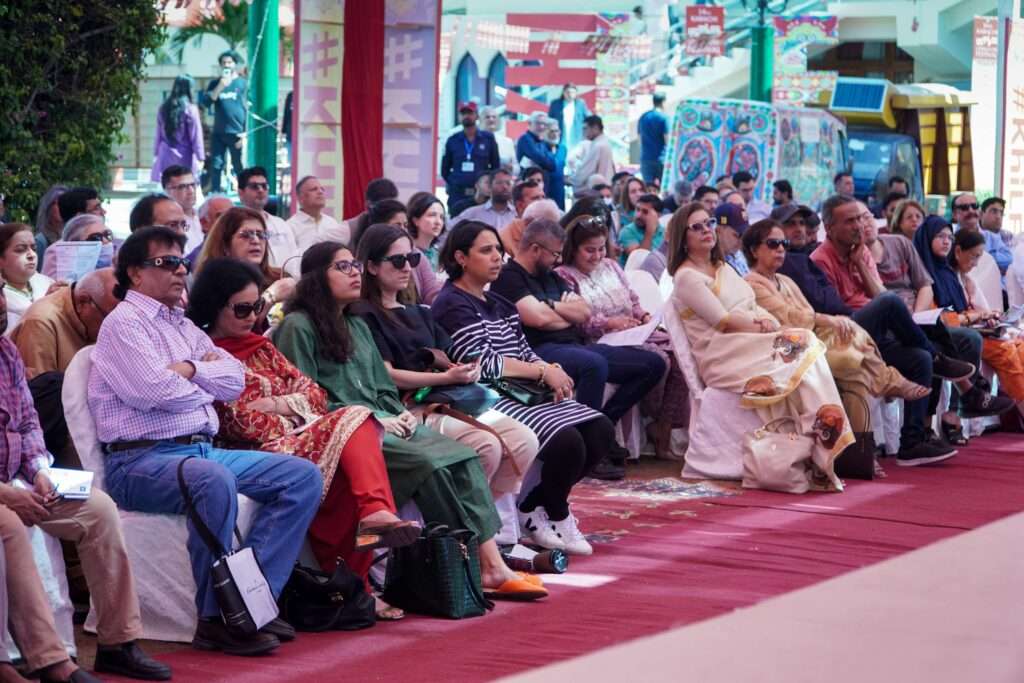
Mr. Sehgal then reflected on China’s interest –Belt and Road Initiative – the Chinese intention to have a land-based communication route to Europe and Asia. One of the proems has been that people have lost track of a particular connectivity that existed post the Regional Cooperation for Development (RCD) highway.
Today, those two routes have become the primary links, and the third one is the China-Pakistan Economic Corridor. You cannot do everything, but upgrading these routes would connect Karachi to Gwadar to Chabahar, upgrading the Chaman route, and the Kandahar route would provide two links to Eurasia. India is losing out on this because if India would connect to us, and we have a railway connection to ‘Khokhrapar’ and through Lahore, the entire South Asia, Southeast Asia, and four South Asian countries could get their goods into Central Asia or even Europe.
We lose complementary services, but our textiles still go to Bangladesh, and cotton still goes to Bangladesh. Tea has paid off a lot of the things, and it still comes in, but what India can give to us and what we can give to India is a great loss. The roots exist, and they just need upgrading. The Old RCD Highway, the North-South Route, and the transnational railway even the railway to Iran – which is broad railway. The railway going through Quetta to Kandahar just needs that connection because it is narrow gauge from Quetta to the border and it just needs the connection to Kandahar broad gauge. Then it goes up to Mazar-I-Sharif, then to Torghundi, and from there into Central Asia and all the countries of Central Asia.
Mr. Sehgal expressed his views on nationalism, he said, “I don’t think nationalism by itself is inherently bad. However, religious nationalism is dangerous and that is what is emerging in India. This religious nationalism threatens the country’s 200 million Muslim population in Bangladesh, as well as Sri Lanka and Nepal, which have difficult relationships with India. India’s desire for domination has caused issues in Nepal, which is a landlocked country and has a lot of interest from China. Religious nationalism encroaches on the beliefs and way of life of others, creating a sense of apprehension in the region.
While every country has the right to hold its people together through nationalism, religious nationalism is exclusionary and concerning. The situation in Pakistan is an example of this. The country is being excluded from various initiatives, including the Indian Ocean peripheral station, despite having a long coastline in the region. Pakistan has an affinity with Gulf countries like Saudi Arabia and a long border with Iran. The country cannot afford to be in opposition to its neighbors due to its own situation.
Despite sporadic incidents, there is potential for improvement. The Aam Aadmi Party in New Delhi, the capital city of India, has managed to cut across religious barriers and achieve a victory despite the dominance of the BJP in other areas. This could potentially balance out the negative effects of religious nationalism in the region, leading to a more open South Asia.
I believe that in Pakistan, we should not link our relationship with the United States to India. India is a vast country, both economically and politically, and given the United States’ China situation, it is bound to have a strong relationship with India. Instead, we should focus on our own relationship with the United States. The situation in Afghanistan has worked in our favor, as the United States is re-engaging with us, recognizing that the Pakistan Armed Forces are the only true deterrent to the spread of terrorism not only in South Asia, but all over the world. It is a fact that cannot be ignored, even if at the moment, they are not the favorite for various political reasons. This deterrent has successfully countered insurgency and terrorism in history but has not addressed the root causes. As we have seen with recent incidents like the fireworks in Karachi, the problem still persists.
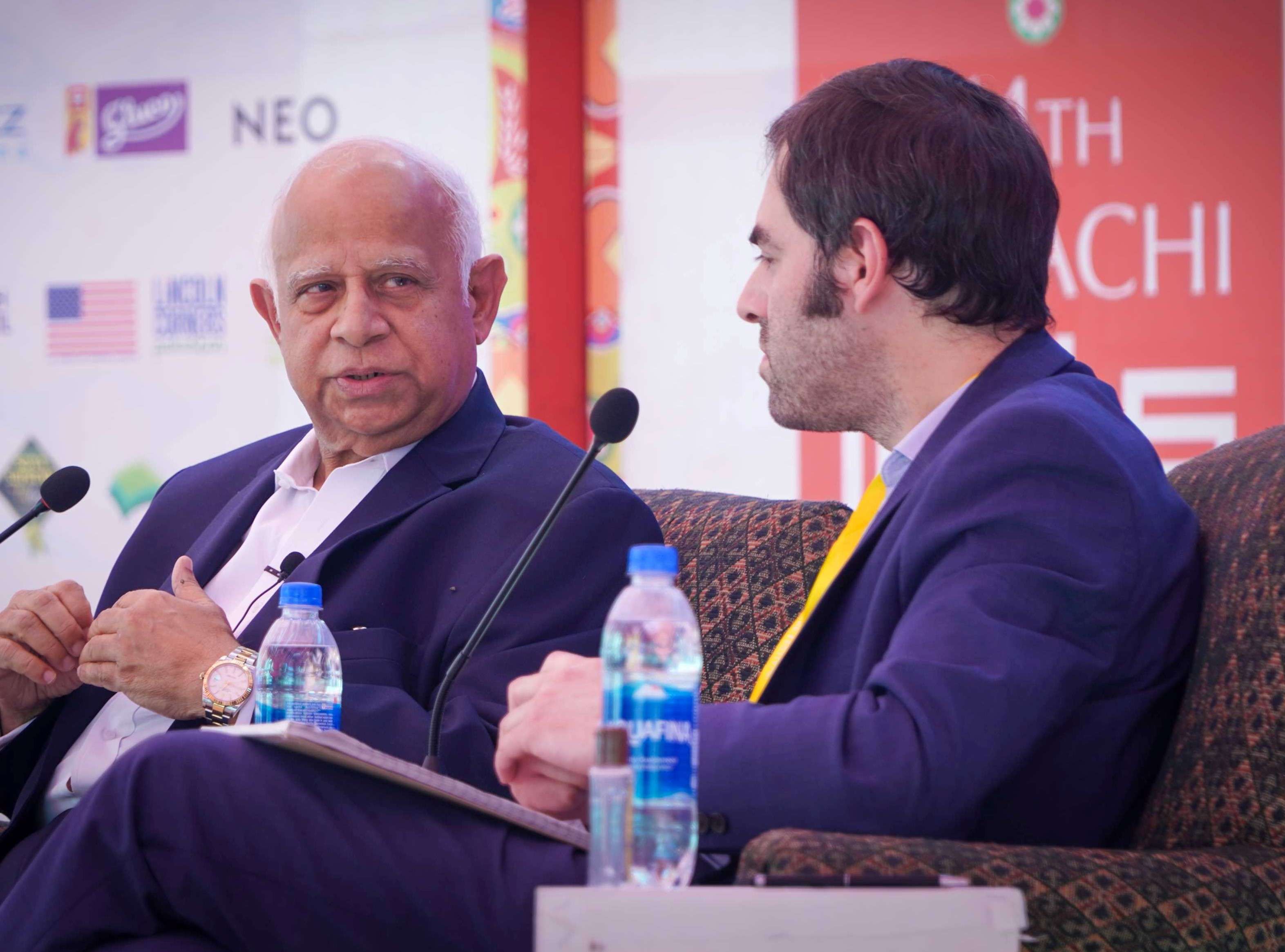
If we can communicate to India that it is in our best interest to work together, without subscribing to the “enemy of an enemy is a friend” philosophy, we could make progress. Some of my closest friends are Indian industrialists and businessmen I met through the World Economic Forum, and many attended my son’s wedding in Islamabad in 2008. I remain in touch with them and speak to them directly, and they often ask me when I will visit India.
I always reply, get me a Visa and I will come to India. However, the BJP government is attempting to isolate us, which makes it difficult. If there is a balance of power in the region and stronger opposition to the central government, we can begin to untangle the knots in South Asia, even if the BJP is not going anywhere soon.
He further commented on water issue, “Firstly, I want to mention a silver lining in the Indus Basin treaty. Despite three wars between India and Pakistan, the treaty has not been touched. However, if another war were to happen, it would likely be fought over water. Water is the lifeline of any nation, and people depend on it for their livelihoods.
Secondly, regarding China and India, 50 years ago, I flew a helicopter attached to the People’s Liberation Army. The Chinese did not have helicopters at that time and were building the Karakoram Highway. I saw some of the current disputed regions, which the Chinese now occupy in Ladakh. India cannot take these positions back from China, as the Chinese have created roads and logistics up to where they are. Although India is not saying it, the fact remains that the territories that the Chinese are occupying were once in Indian hands. If there was ever a conflict, that area would be overrun in days or weeks.
I believe the status quo should remain, and we should not enter into a Ukrainian-type situation. This would not be good for either India or Pakistan because Pakistan would be under pressure from all sides, especially public pressure, as in 1962. In 1962, when Pakistan was ready to go into Kashmir, the United States stepped in, and India agreed to talks in Kashmir after the conflict. President Ayub decided not to engage in hostility.
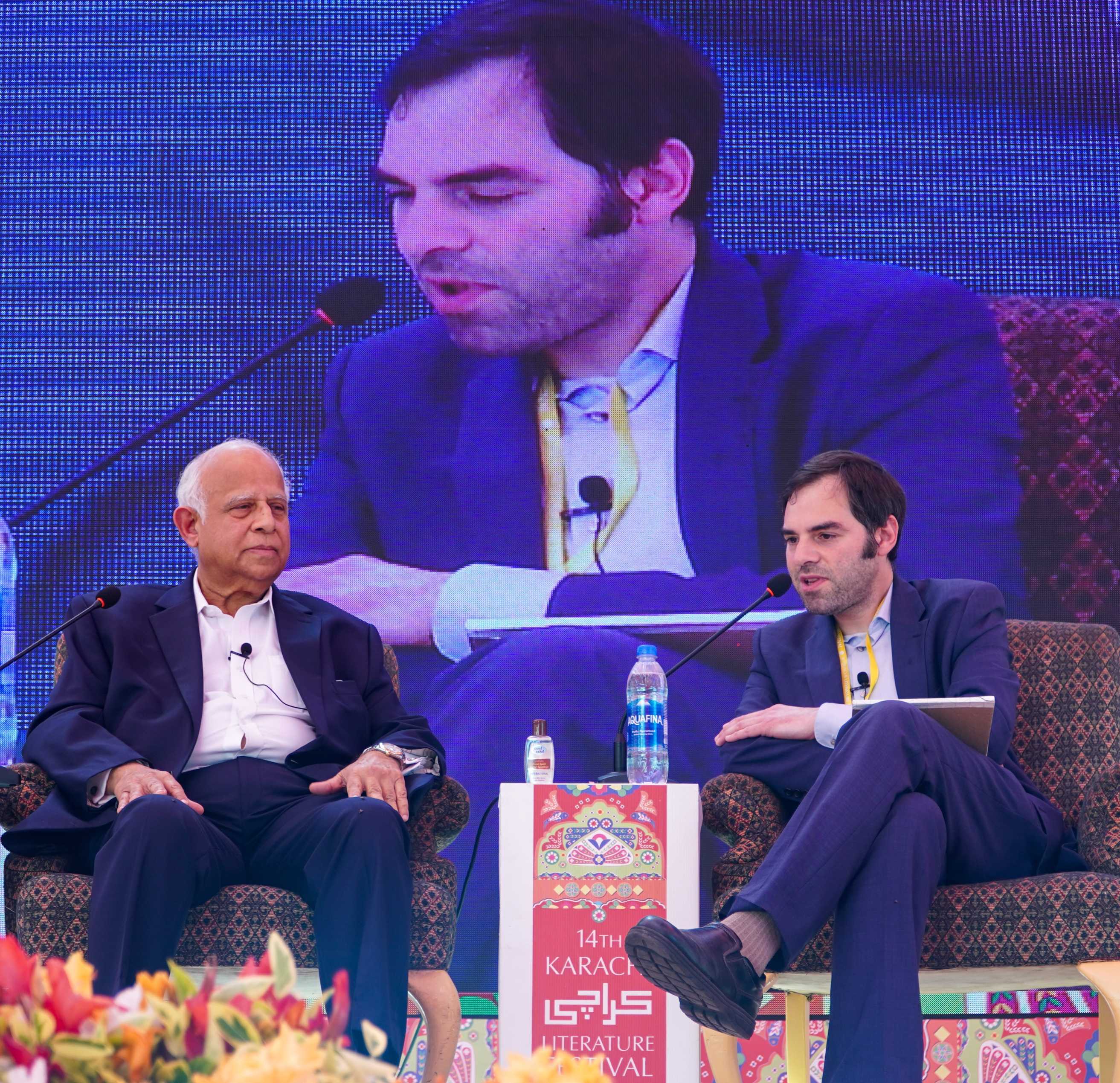
However, our current leaders may not be as strong as Ayub, and they may be tempted to engage in hostility, which could lead to a wider conflict. We should not expect India to sit back and do nothing. He emphasized on economic solution saying that, “ The solution is economic because we have complementary economies and complement and promise throughout South Asia. We consume a lot of tea and jute in Bangladesh or India, and Bangladesh does need our type of cotton – gray cloth, for example, to make it better qualified everything. If we open up the pharmaceutical side, the prices of medicine would drop in Pakistan considerably.
Similarly, as you mentioned earlier, there has been an occasion where Pakistan has balanced its vegetable prices by importing them across the border from India to keep the prices down. So, if we were to at least trade like China and India, trade would be at an all-time high, except for the fact that India has banned TikTok. That was a political decision, but I think in the long run, they also thought about covering its mobile telephone companies and keeping them within certain restrictions. I see a role for the United States in untangling South Asia.
The United States is a superpower and has an interest in this region, leaving aside its interest in containing China. The United States has an interest in ensuring that one of the largest nuclear powers in this region is Pakistan. We have the nuclear assets and the means to deliver them.
Nobody is scared of them except India, because they are India-specific. So, China, Iran, and the Middle East are not worried about it. But the fact remains that destabilizing Pakistan would not be in the interest of the United States. Therefore, the United States must have a greater role in untangling the South system. It has influenced it, maybe not to an inordinate degree, as we see that they could not stop the Indians from taking Russian oil, but the point is that it does have a role to play because so much of the United States’ investments are in India now, and they won’t be affected. Mr. Sehgal then explained the the China-Pakistan Economic Corridor (CPEC), “I think there are two things to it. First of all, it’s necessary for Pakistan, but in a way, it’s far more necessary for China. They need an outlet. We saved by the night in Southeast Asia, which we’ve been involved in, but the central thing is completely gone. So, this leaves them almost with this only existing route. But if you travel on that road, and I have, of course, extensively many years ago, and I know that area, it’s very difficult to see large volumes of trade coming down that road or going up that road. I think if the United States really engages with Pakistan on Gwadar, I think that is something, that must happen because United States engaging in Gwadar would take our over-reliance on a superpower. We are relying out of sheer necessity. There’s nobody else, and we do need Gwadar. We have
beaches from ‘Sonmiani’ down right up to ‘Gwadar’ sun swept 330 days of the year. You cannot imagine what beautiful lagoons there are and how beautiful this is getting. Of course, vast open areas where industries can come up, cultivation can come up. So, I think we do need United States’ engagement in this area, India is threatened because they say that if it is passing through disputed territory, etc., call it that. 50 years ago, it only started when it became more serious.
I think my feeling is that one of the things that we in Pakistan need to do is to engage the United States into CPEC and see that it is a place from where we can have stability because the north-south access or the RCD access also comes out of CPEC.
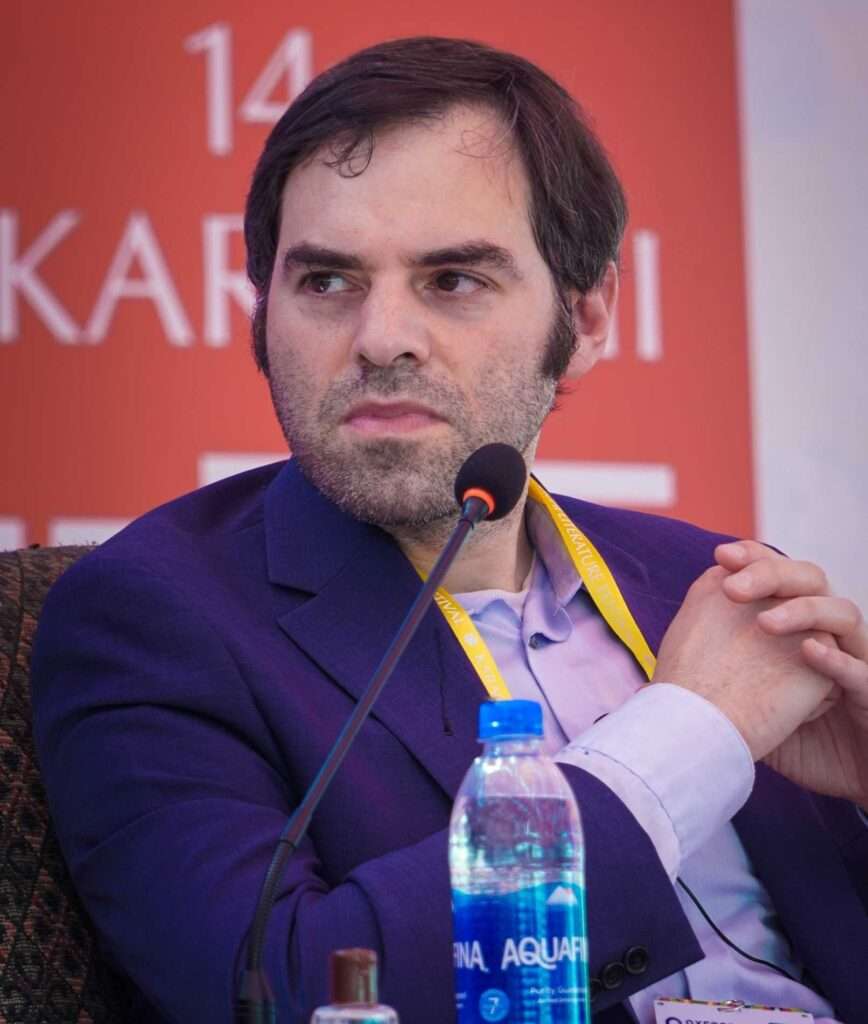
Lastly, Mr. Sehgal shared his view on the Kashmir issue, “First of all, there should be a Hindu or a minority person who should head the minority committee. Let me also tell you that in Pakistan, my best friend Moti Lakhwani is a Hindu, and one of my best friends in India was Pawan, who fought against me and is a Sikh.
So, I think that there is no relationship when it comes to fighting for your country or having friendships, etc. However, I deliberately left the Kashmir equation, and I think you did not touch upon it for the reason that around 20 to 22 years ago, floated a suggestion in writing, which said that we should freeze the Kashmir situation for some time. In the sense that we should allow easy trade between East and West, which is the natural trade within Kashmir, and make the borders soft so that Kashmiris on both sides of the border could visit each other. That did start, and bus services and all that started. If you remember, during General Musharraf’s era, we almost had an agreement on that basis. I think we cannot put this thing under the carpet. Kashmir is a question that is very important to us; it is a central core question. But at the same time, we must also realize that I don’t know any Indian who is ready to give up an inch of Kashmir. So, I think we will have to come to a solution that is palatable to both India and Pakistan, and that is meant for the Kashmiris to solve their own destinies, as we have been saying all along.”


